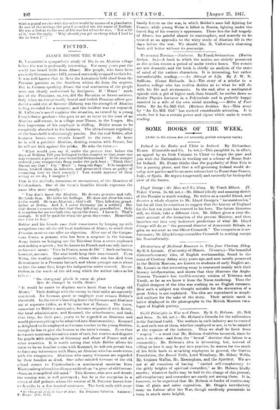FICTION.
ALSACE BEFORE THE WAR.*
VALLOTTON'S sympathetic study of life in an Alsatian tillage befure the war is profoundly interesting. For many years peat the world has heard little from Alsace. Her people, who have been paativels•Clermatesince 187 I, seemed outwardly resigned to I heir lot. It was well known that in Metz the Lorrainers held aloof from the Trwseian garrison as. the Southern whites do. from the negroes. But in German.speaking Alsace the real sentiments of the people were not clearly tunlerateed by foreigners. II Heusi " made (Am of the Prussians, so, tee, did the Bavarian or Saxon satirists. lid••• when an exceptionally brutal and foolish Prussian officer pro. dead a mild riot at Saverne (Zaltern) was the strength of Alsatian fesling revealed fur a moment, and this incident was not repeated. M. Vellotion's novel explains the situation, as viewed Ii; a.young FreneleSwiss graduate who goes to act as tutor to Ore sons of an Alsatian mill-owner, in a village near Therm, in the Vosges. His. firs; impression of Ida employer is drilling. Bolder seems to he completely absorbed in his business. The ultra-00.mm regularity of the household is distressingly precise. But the real Bolder, after t siness hours, soon reveals himself to the tutor. At heart he is still a patriotic Alsatian, desiring reunion with France, but he will not kick against the peeks. He asks the tutor :—
" What would you say if, under the pretext that before the days of 1Villiam 'felt you belonged to this country or that,seme one was to annex a piece of your beautiful Switzerland if the usurper ordered your compatriots flung under the jack-hoot ' Think this ! Do not say that ! Cry " Hoch " ; hang out flags.' If he suspected them. treated them as inferiors, and persecuted them as guilty of remaining true to their country ? You would approve of their mains as we do, I imagine 1" That is the attitude, tenacious or unconscious, of Oat Alsatians of Frieslansbach. One of the tutor's humbler friends expresses the Alone idea more simply :—
"You don't know the Alsatian. He detests gestures and talk. He holds firm. Ho hides his feelings. He does not show his roots t., the world. He is an Alsatian ; that's all. They killed my greed. father at Sedan. And I, I serve Germany (as a soldier]. But tied doesn't remove the fart that they killed my grandfather. Only it is useless for me to chalk t hat lip on the doors. l know it. That's enough. It will he paid for when the great days come. Meanwhile orre trios to live."
Bolder and his friends cane their consciences. by keeping up with scrupulous care all the old heal traditions of Alsace, to which their Pritesian masters can offer no objection. After one of the Gargan- tuan feast..., a peasant who has been a sergeant in the German Army insists on bringing out the Tricolour from a secret cupboard and making a speech ; but he knows no French and ea, only mutter
in !IA excit s Vise la France, noun the Did " ! Such outbursts, however, are rare. The wise heads keep their own counsel. Even Weise., the wealthy manufacturer, whose elder son has died from ill-treatment in a Prussian barrack and whose younger sun is about so face the same fate, keeps his indignation under control. Never- theless. in the words of the old song which the author takes as his title :— "On changerait plut6t, lc emu de place Quo de changer la vieille Alsace."
" It would be easier to displace one'a heart than to change old Alsace" Their dealings with the meaty in their midst are narrowly reeteicted. No German guest or employer ever crosses Bolder's, Itreallald In the tutor's bearding-bonne the Germans and Alsatians, oat at separate tables, as if by some law of Nature. The tutor, somewhat to Bohlerse atutoyance, becomes acquainted with Kraut, the local administrator, and Kimmel, the schoolmaster, and Mule that they, for their part, yearn to be regarded so Alsatians and would give everything to be admitted into Algal ian societ y. Ktunmel is delighted to be employed as German teacher to the young Bottlers, though he has to site the lessons in the tutor's rooms. Even then Le cannot overcome his native want of tact, but wearies and disgusts his pupils with eulogies of Germany and abuse of France and all other countries. It is areal, noting that while Boiler allows his tutor to be on familiar terms with Ktunrnel, he will not permit him ts• have any intercourse with Maus, an Alsatian who has made terms with the conquerors. Alsatians who marry Cements are regarded by their families as deed. One sober-minded German of the old school comes to Friedensbach—a sentimental musician front Wart Lemberg whom his col keg twa ritlimtle.as "a piece of out German thins, an evangelical out maid." This Kroner, who sees and dreads the coming war, is well portrayed ; but he is the exception in a crowd of dull pedants. whom the creator of M. Pot terat knowe how to describe in a few ironical sentences. The book ends with some
• au clones:gas pt:d.w. It Clew its !'tare. Par rennunin Vallottsa lanamaCt F. Ininye. 111.. tAr.1 family kneel on the woo, in which Bohler's sons fall fighting be France, while voting Weiss is. tilled in Russia, fighting under tie, hated flag of his country's oppressors. There lies the full tragedy of Alsace, too painful almost to contemplate, and scarcely to M. treated as an appendix to the witty study of Alsatian life in time days before the war. We should like M. Vallotton's charming book still bettor without its postscript.


























 Previous page
Previous page